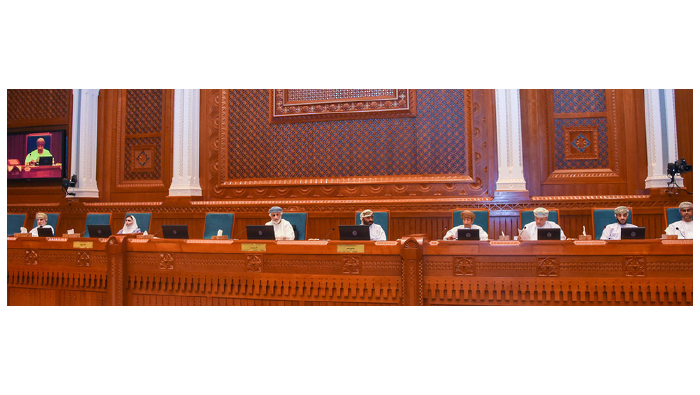
Muscat: The State Council discussed the draft ‘Biometric Fingerprint Law’ referred by the Council of Ministers, and the opinion of the Legal Committee on it.
The Council also discussed the study submitted by the Culture, Information and Tourism Committee on ‘Arts and their role in supporting the national economy’.
This came during the seventh session of the fourth session of the seventh term of the State Council, chaired by Sheikh Abdulmalik bin Abdullah al-Khalili, Chairman of the Council, in the presence of the honourable members of the Council, and the Secretary-General.
In a statement Rashid bin Salem al Badi, Chairman of the Legal Committee, explained that the committee appreciates the importance of the draft biometric fingerprint law due to the absence of legislation regulating the collection, preservation, use, storage and disposal of biological samples in a way that guarantees the legal use of these samples in biotechnology and its products and the protection of genetic data in the Sultanate of Oman.
He added that the committee discussed the draft law, the opinion of the Shura Council, and the observations made by the honourable members of the Council, and concluded with the preparation of a report that includes formal and substantive observations about the draft articles.
During the extensive discussions of the draft law, the members expressed their views and observations regarding the amendment of some articles.
The session also discussed the study submitted by the Culture, Media and Tourism Committee on “Arts and their Role in Supporting the National Economy”, where Dr Aisha bint Hamad Al Darmaki, Chairperson of the Committee, explained the importance of this sector in supporting the national economy and diversifying sources of income as one of the promising areas for economic diversification.
She added that what has been taken by the government during the last stage in the field of arts is one of the achievements of the Omani society that must be preserved and developed economically.
She explained that the study sheds light on the arts, and its role as an important tributary for the national economy, in line with achieving the goals of the future vision of Oman 2040, noting that updating legislation, systems and regulations governing the arts sector enhances efficiency in investment for this sector, and includes the arts sector as an economic industry within the five-year plans. The Sultanate of Oman is working on raising its contribution to the gross domestic product and the volume of production to generate jobs and business opportunities.
The chairperson of the committee confirmed that the study’s endeavour to enhance the integration of roles and activate government partnership with the private sector and civil society comes in order to adopt projects that enhance the arts sector and the creative economy, and to employ the arts sector that abounds in all governorates of the Sultanate of Oman to be among the paths and tributaries of stimulating tourism and cultural activities and community events.
She stressed the need for developing areas in a sustainable manner, and enhancing the investment of artistic and specialised festivals to encourage and support workers in the arts sector.
At the end of the session, the members were briefed on the report of the General Secretariat on the activities of the Council’s organs.